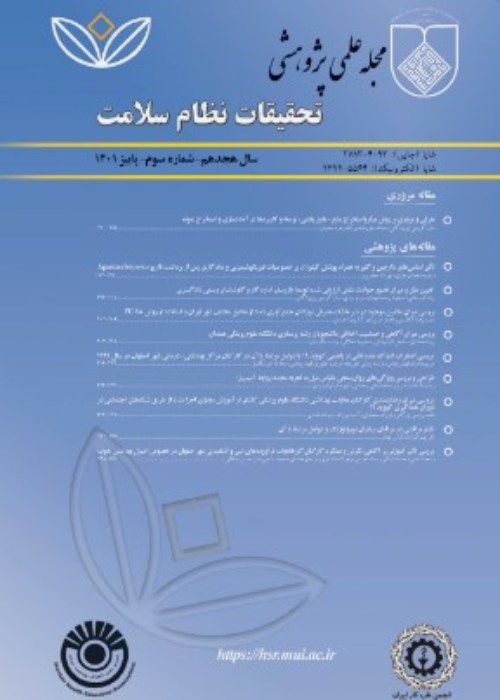Survey of the Medication Errors and Refusal to Report Medication Errors from the Viewpoints of Nurses in Hospitals Affiliated to Isfahan University of Medical Sciences, Iran
Author(s):
Abstract:
Background
Medication errors as a universal challenge may lead to severe damages or even death of patients. Initial and natural results of medical errors increase duration of hospitalization and costs. Overall، medical errors have negative effects on patients، nurses، and organizations and lead to decline in the quality of care provided. The purpose of this study was to determine the incidence of medication errors، and provide reasons for nurses’ refusal to report these errors. Methods
This was a descriptive-correlation study conducted in nurses with cluster sampling methodology in 2012. A total number of 280 nurses from hospitals affiliated with Isfahan University of Medical Sciences، Iran، were enrolled. A questionnaire consisting of 3 parts was used for data collection. The data were analyzed using SPSS software version18. Findings
The majority of subjects were females (85%) with work experience of less than 5 years (65%). Medication errors happened in 20% of subjects. Mean score of medication errors for each nurse was 11 in 3 months، whereas mean score of medication errors reported for each nurse were 1. 5 during the same time. The most common medication errors which were reported included the wrong infusion speed (19%) and wrong dosage (12%). Nurses estimated that 13. 6% of medication errors were reported by them. Among all causes under investigation، «fear of reporting consequences» had the highest score. From the 7 existing items in the domain of «fear of reporting consequences»، «fear of Legal Issues»، was the main cause for refusing to report medication errors. Conclusion
Due to the importance of patient safety، it is essential to develop an efficient system to document and report errors in order to decrease medication errors. Moreover، it is recommended that administrators and nursing instructors improve academic ability and knowledge of nurses in this field by enriching training courses. Moreover، since fear of reporting consequences was one of the main factors for refusing to report medication errors، nursing managers should react positively towards the reports of medication errors by nursing.Keywords:
Language:
Persian
Published:
Journal of Health System Research, Volume:9 Issue: 1, 2013
Pages:
76 to 85
magiran.com/p1141978
دانلود و مطالعه متن این مقاله با یکی از روشهای زیر امکان پذیر است:
اشتراک شخصی
با عضویت و پرداخت آنلاین حق اشتراک یکساله به مبلغ 1,390,000ريال میتوانید 70 عنوان مطلب دانلود کنید!
اشتراک سازمانی
به کتابخانه دانشگاه یا محل کار خود پیشنهاد کنید تا اشتراک سازمانی این پایگاه را برای دسترسی نامحدود همه کاربران به متن مطالب تهیه نمایند!
توجه!
- حق عضویت دریافتی صرف حمایت از نشریات عضو و نگهداری، تکمیل و توسعه مگیران میشود.
- پرداخت حق اشتراک و دانلود مقالات اجازه بازنشر آن در سایر رسانههای چاپی و دیجیتال را به کاربر نمیدهد.
In order to view content subscription is required
Personal subscription
Subscribe magiran.com for 70 € euros via PayPal and download 70 articles during a year.
Organization subscription
Please contact us to subscribe your university or library for unlimited access!


